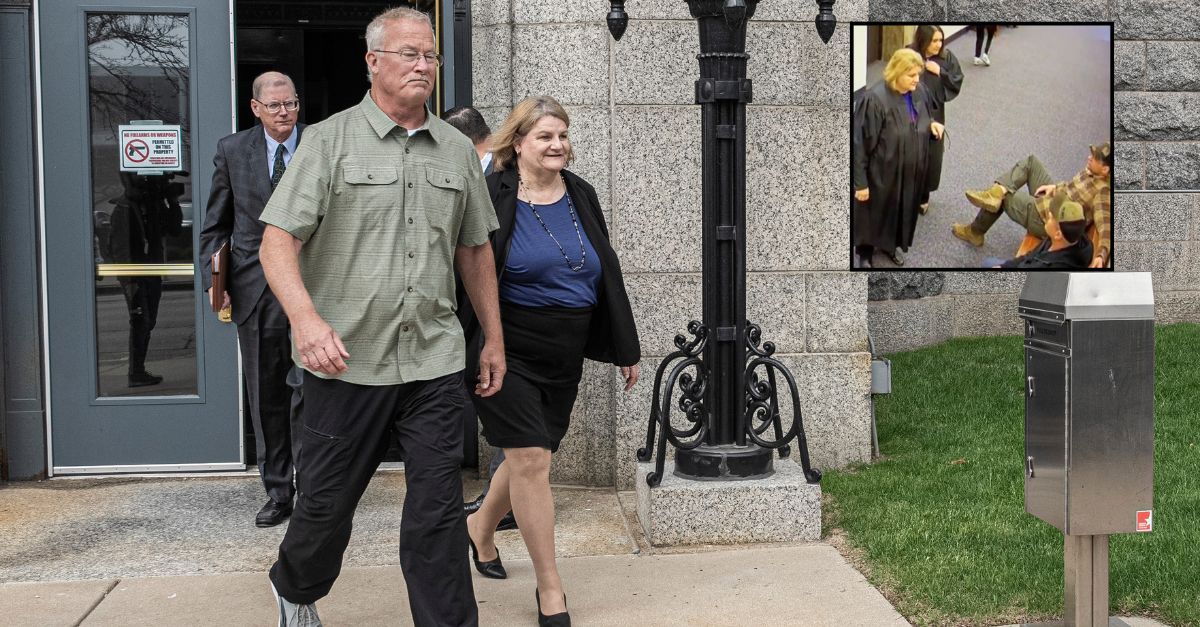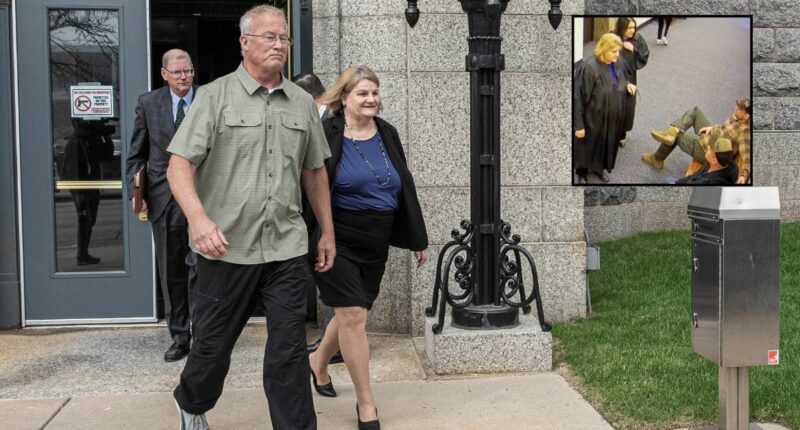
Background: Milwaukee County Circuit Judge Hannah Dugan leaves the federal courthouse after a hearing Thursday, May 15, 2025, in Milwaukee (AP Photo/Andy Manis). Inset: Surveillance video shows Milwaukee County Judge Hannah Dugan speaking with ICE agents before Eduardo Flores-Ruiz”s detainment (WDJT/YouTube).
The case of Milwaukee County Judge Hannah Dugan – the Wisconsin circuit court judge accused of helping an immigrant evade Immigration and Customs Enforcement agents – should proceed and not be dismissed, a federal magistrate recommended, finding the state judge’s argument that she has judicial immunity from criminal prosecution unconvincing.
As Law&Crime has previously reported, Dugan has pleaded not guilty to the federal crimes of knowingly concealing a person for whose arrest a warrant and process had been issued and obstruction of the United States Department of Homeland Security’s removal proceedings. She has sought to have the case thrown out, principally arguing that she has immunity from prosecution for official judicial acts.
U.S. Magistrate Judge Nancy Joseph in the Eastern District of Wisconsin was not swayed by this claim, finding that while judges are largely immune in civil cases for their official actions, no such judicial immunity exists when a judge is criminally charged.
“[D]oes judicial immunity shield Dugan from prosecution because the indictment alleges she violated federal criminal law while performing judicial duties? The answer is no,” Joseph wrote in her 37-page filing, adding that “there is no firmly established absolute judicial immunity barring criminal prosecution of judges for judicial acts.”
Joseph pointed to other criminal cases – such as the 2008 “Kids for Cash” scandal in which two judges were charged and convicted of accepting bribes in exchange for harshly sentencing children – as an example of judges being prosecuted for alleged actions they took in their official capacities.
Dugan attempted to separate her case from these by maintaining her “charged acts are devoid of the self-enrichment or self-gratification that marks earlier cases in which judges were convicted for using judicial status as leverage or opportunity for a bribe, kickback, or favor, or to commit another crime.”
Joseph found this argument misplaced.
“[T]he distinction that takes these official duty cases out of the shield of immunity is not self-enrichment or the motive of the judge. It is whether the criminal law has been violated,” she writes. “In other words, a judge’s actions, even when done in her official capacity, does not bar criminal prosecution if the actions were done in violation of the criminal law.”
Furthermore, she wrote that because Dugan is allegedly to have acted “corruptly,” judicial immunity — even to the extent it exists when a judge is acting in their official capacity — “does not shield against corruption.”
Love true crime? Sign up for our newsletter, The Law&Crime Docket, to get the latest real-life crime stories delivered right to your inbox.
Dugan’s lawyers presented more claims as to why her case should be dismissed, pointing to a name frequently seen in federal courts: President Donald Trump. They argued that, when the Supreme Court found last year that Trump has broad immunity for official acts taken while president, the justices were indirectly finding that judges have broad immunity in criminal cases for their official actions.
Here, again, Joseph was “unconvinced” – and she held that the case of the president is too unique to expand to others.
“I am unconvinced that either the common law or the Trump decision provide the authority for applying the civil framework of absolute judicial immunity for judicial acts to the prosecution of judges for crimes that relate to official duties,” she wrote.
Dugan also argued that her prosecution violates separation of powers under the 10th Amendment because it “effectively overrides” the state’s ability “to administer its own courts” and impedes on the day-to-day function of state courts.
Joseph disagreed here, finding that the claims should go before a jury.
“Whether Dugan violated these statutes as the government accuses, or whether she was merely performing her judicial duties as Dugan asserts, these are questions for a jury that cannot be resolved on a motion to dismiss,” Joseph wrote. “Additionally, that the allegations could also be addressed, or are better addressed, by the state’s own judicial discipline procedures does not, as a matter of constitutional law, require dismissal of the indictment.”
Joseph’s filing on Monday is a recommendation that will move to the presiding judge, U.S. District Judge Lynn Adelman, who will make the final decision. Joseph maintained that in no part of her filing did she consider the merits of the allegations against Dugan – and that the judge is innocent until proven guilty.
An attorney for Dugan said they will appeal Joseph’s recommendation.
“We are disappointed in the magistrate judge’s non-binding recommendation, and we will appeal it,” Dugan attorney Steven Biskupic, a former federal prosecutor, told The Associated Press. “This is only one step in what we expect will be a long journey to preserve the independence and integrity of our courts.”
Dugan was indicted on May 13 for allegedly helping an undocumented immigrant, Eduardo Flores-Ruiz, get away from ICE officers shortly after he appeared in her courtroom in connection with a domestic abuse case. She filed a motion for dismissal the very next day, arguing she has broad judicial immunity. Flores-Ruiz was later arrested.
The U.S. Justice Department countered Dugan’s effort to drop the case, arguing that dismissing the charges because Dugan is “immune” would be unprecedented. “Such a ruling would give state court judges carte blanche to interfere with valid law enforcement actions by federal agents in public hallways of a courthouse, and perhaps even beyond,” the DOJ said in its response.
More than 130 former state and federal judges signed their names in an amicus brief filed May 30 asking the court to dismiss Dugan’s charges. “The indictment in this matter raises important questions concerning judicial immunity, maintaining an impartial and independent judiciary, public trust in the judicial process, and anticommandeering of state officers and institutions under the Tenth Amendment,” they wrote.
Another amicus brief was filed on June 9 in opposition to Dugan’s motion to dismiss the indictment. On Monday, Joseph granted the motions for the amicus briefs to be officially accepted.
Dugan’s case has become a national symbol surrounding the Trump administration’s immigration efforts and feuds with the judiciary. Allies of Trump have condemned the judge and claimed her situation is emblematic of a larger system of “activist judges” abusing their authority to “sabotage” the president’s agenda. Democrats, on the other hand, have accused the administration of trying to make an example of Dugan to quell judicial opposition to its actions.




